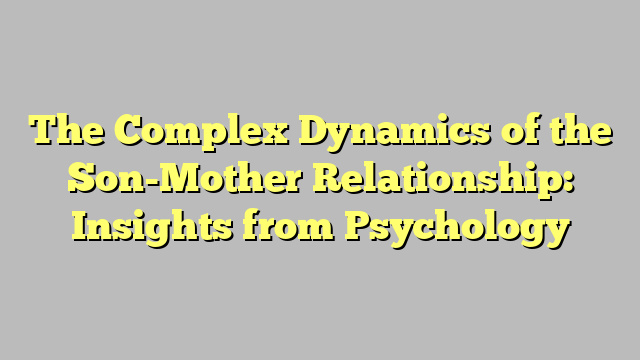The Complex Dynamics of the Son-Mother Relationship: Insights from Psychology
The Complex Dynamics of the Son-Mother Relationship: Insights from Psychology
Introduction
The relationship between a son and his mother is a unique and complex bond that has been the subject of much study in the field of psychology. This article aims to explore the various dynamics that shape this relationship and provide insights into the psychological factors that influence it.
1. Attachment Theory
Attachment theory, developed by John Bowlby, suggests that the early bond between a child and their primary caregiver, usually the mother, plays a crucial role in shaping their future relationships. The quality of this attachment can have a significant impact on the son-mother relationship.
Research has shown that a secure attachment between a son and his mother can lead to positive outcomes, such as increased self-esteem, emotional regulation, and better social skills. On the other hand, an insecure attachment can result in difficulties in forming healthy relationships and emotional instability.
2. Role of Gender
The son-mother relationship is also influenced by societal expectations and gender roles. Traditional gender norms often dictate that sons should be more independent and less emotionally expressive compared to daughters. This can create challenges in the mother-son relationship, as mothers may struggle to balance their desire to foster emotional closeness with their sons while also encouraging their independence.
Research has shown that mothers tend to engage in more physical play and roughhousing with their sons, which can help foster their physical development and independence. However, this emphasis on physicality may sometimes overshadow emotional intimacy, leading to a potential imbalance in the relationship.
3. Oedipus Complex
Sigmund Freud’s theory of the Oedipus complex suggests that young boys experience unconscious sexual desires for their mothers and view their fathers as rivals. While this theory has been widely criticized, it highlights the complex and sometimes conflicting emotions that can arise in the son-mother relationship.
Freud believed that the resolution of the Oedipus complex is crucial for healthy psychological development. Sons who successfully navigate this stage are said to develop a stronger sense of identity and a healthier relationship with their mothers. However, unresolved Oedipal conflicts can lead to difficulties in forming intimate relationships later in life.
4. Maternal Influence
Mothers play a significant role in shaping their sons’ emotional and social development. Research has shown that the quality of the mother-son relationship can impact various aspects of a son’s life, including his self-esteem, academic performance, and overall well-being.
Mothers who provide emotional support, set appropriate boundaries, and encourage autonomy can help their sons develop a healthy sense of self. On the other hand, overprotective or controlling mothers may hinder their sons’ independence and hinder their ability to form healthy relationships.
5. Cultural Factors
The dynamics of the son-mother relationship can also be influenced by cultural factors. Different cultures have varying expectations and norms regarding the roles and responsibilities of sons and mothers.
For example, in collectivist cultures, where the emphasis is on the family unit rather than individual autonomy, the son-mother relationship may be more interdependent and closely knit. In contrast, individualistic cultures may prioritize independence and self-reliance, potentially leading to a more distant relationship between sons and mothers.
Conclusion
The son-mother relationship is a complex and multifaceted bond that is influenced by various psychological, societal, and cultural factors. Understanding these dynamics can provide valuable insights into the development and maintenance of this relationship.
Attachment theory highlights the importance of a secure attachment between a son and his mother, while the role of gender and societal expectations can create unique challenges. Freud’s theory of the Oedipus complex sheds light on the unconscious desires and conflicts that can arise in this relationship.
Mothers play a crucial role in shaping their sons’ emotional and social development, and cultural factors can further shape the dynamics of the son-mother relationship. By gaining a deeper understanding of these dynamics, we can foster healthier and more fulfilling relationships between sons and their mothers.

